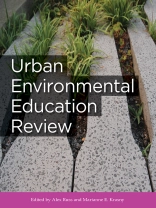Urban Environmental Education Review explores how environmental education can contribute to urban sustainability. Urban environmental education includes any practices that create learning opportunities to foster individual and community well-being and environmental quality in cities. It fosters novel educational approaches and helps debunk common assumptions that cities are ecologically barren and that city people don’t care for, or need, urban nature or a healthy environment.
Topics in Urban Environmental Education Review range from the urban context to theoretical underpinnings, educational settings, participants, and educational approaches in urban environmental education. Chapters integrate research and practice to help aspiring and practicing environmental educators, urban planners, and other environmental leaders achieve their goals in terms of education, youth and community development, and environmental quality in cities.
The ten-essay series Urban EE Essays, excerpted from Urban Environmental Education Review, may be found here: naaee.org/eepro/resources/urban-ee-essays. These essays explore various perspectives on urban environmental education and may be reprinted/reproduced only with permission from Cornell University Press.
Tabela de Conteúdo
Foreword, Justin Dillon, Judy Braus, Kartikeya Sarabhai, and Luiz Marcelo de Carvalho Introduction, Alex Russ and Marianne E. Krasny Part I. Urban Context1. Advancing Urbanization, David Maddox, Harini Nagendra, Thomas Elmqvist, and Alex Russ2. Sustainable Cities, Martha C. Monroe, Arjen E. J. Wals, Hiromi Kobori, and Johanna Ekne3. Four Asian Tigers, Geok Chin Ivy Tan, John Chi-Kin Lee, Tzuchau Chang, and Chankook Kim4. Cities as Opportunities, Daniel Fonseca de Andrade, Soul Shava, and Sanskriti Menon Part II. Theoretical Underpinnings5. Critical Environmental Education, Robert B. Stevenson, Arjen E. J. Wals, Joe E. Heimlich, and Ellen Field6. Environmental Justice, Marcia Mc Kenzie, Jada Renee Koushik, Randolph Haluza-De Lay, Belinda Chin, and Jason Corwin7. Sense of Place, Jennifer D. Adams, David A. Greenwood, Mitchell Thomashow, and Alex Russ8. Climate Change Education, Marianne E. Krasny, Chew-Hung Chang, Marna Hauk, and Bryce B. Du Bois9. Community Assets, Marianne E. Krasny, Simon Beames, and Shorna B. Allred10. Trust and Collaborative Governance, Marc J. Stern and Alexander Hellquist11. Environmental Governance, Marianne E. Krasny, Erika S. Svendsen, Cecil Konijnendijk van den Bosch, Johan Enqvist, and Alex Russ Part III. Educational Settings12. Nonformal Educational Settings, Joe E. Heimlich, Jennifer D. Adams, and Marc J. Stern13. Community Environmental Education, Marianne E. Krasny, Mutizwa Mukute, Olivia M. Aguilar, Mapula Priscilla Masilela, and Lausanne Olvitt14. School Partnerships, Polly L. Knowlton Cockett, Janet E. Dyment, Mariona Espinet, and Yu Huang15. Sustainable Campuses, Scott Ashmann, Felix Pohl, and Dave Barbier Part IV. Participants16. Early Childhood, Victoria Derr, Louise Chawla, and Illène Pevec17. Positive Youth Development, Tania M. Schusler, Jacqueline Davis-Manigaulte, and Amy Cutter-Mackenzie18. Adult Education, Philip Silva and Shelby Gull Laird19. Intergenerational Education, Shih-Tsen Nike Liu and Matthew S. Kaplan20. Inclusive Education, Olivia M. Aguilar, Elizabeth P. Mc Cann, and Kendra Liddicoat21. Educator Professional Development, Rebecca L. Franzen, Cynthia Thomashow, Mary Leou, and Nonyameko Zintle Songqwaru Part V. Educational Approaches22. Cities as Classrooms, Mary Leou, Marianna Kalaitsidaki23. Environmental Arts, Hilary Inwood, Joe E. Heimlich, Kumara S. Ward, and Jennifer D. Adams24. Adventure Education, Denise Mitten, Lewis Ting On Cheung, Wanglin Yan, and Robert Withrow-Clark25. Urban Agriculture, Illène Pevec, Soul Shava, John Nzira, and Michael Barnett26. Ecological Restoration, Elizabeth P. Mc Cann and Tania M. Schusler27. Green Infrastructure, Laura B. Cole, Timon Mc Phearson, Cecilia P. Herzog, and Alex Russ28. Urban Digital Storytelling, Maria Daskolia, Giuliana Dettori, and Raul P. Lejano29. Participatory Urban Planning, Andrew Rudd, Karen Malone, and M’Lis Bartlett30. Educational Trends, Alex Russ and Marianne E. Krasny Afterword, Nicole M. Ardoin, Alan Reid, Heila Lotz-Sisitka, and Édgar J. González Gaudiano
Sobre o autor
Alex Russ is an online course instructor in the Department of Natural Resources at Cornell University. Marianne E. Krasny is Professor in the Department of Natural Resources at Cornell University. She is first author of Civic Ecology: Adaptation and Transformation from the Ground Up.












